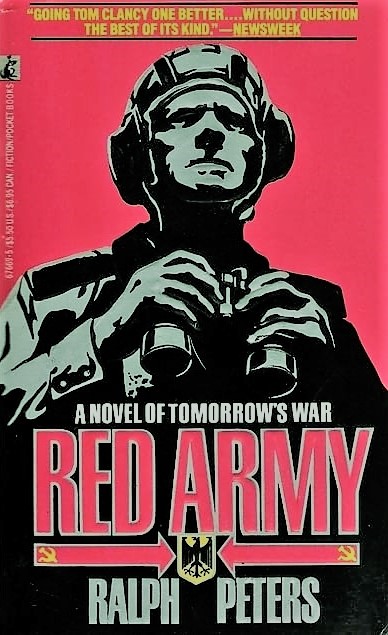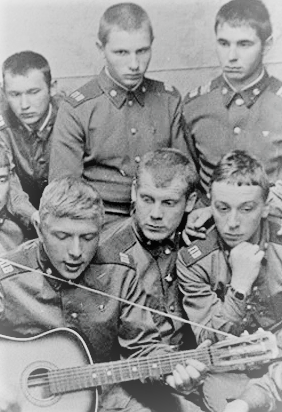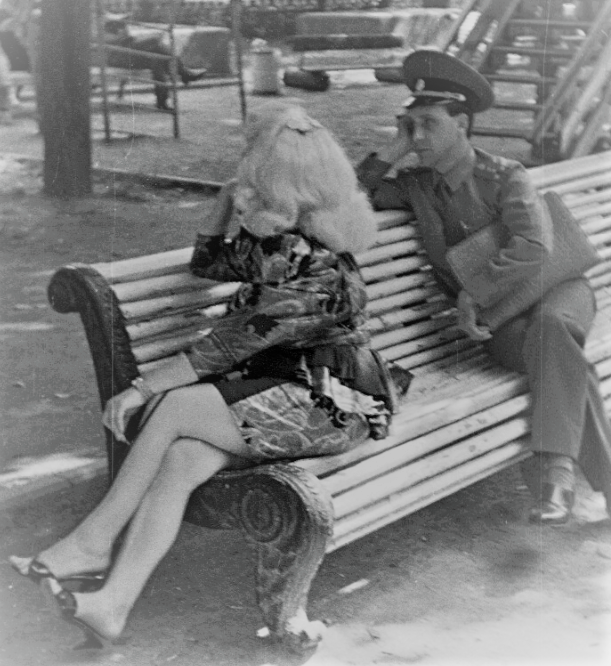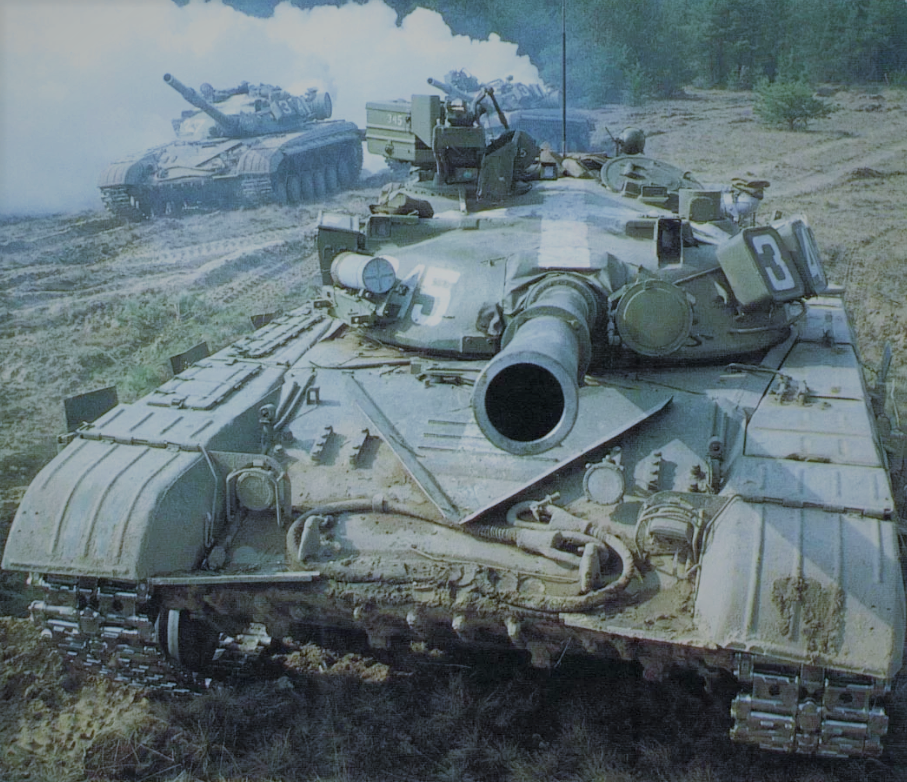Part one of this review is here

Red Army tells the story of an imagined Soviet invasion of western Europe in the 1980s, and tells it entirely from the point of view of Soviet troops. This is no Clancy-esque overview of grand strategy and political manouevres, although Peters does, like Tom Clancy, tell his story through a select series of individuals.
That all of these individuals are in the Soviet armed forces is grist to the Russia-in-fiction mill.
Ralph Peters presents a manageable number of Soviet military men —around a dozen— through whose experiences the war unfolds. Each is well-drawn, with a personal hinterland and inner life that makes them more than ciphers for unfolding action. Taken together, these men provide the colours with which Ralph Peters paints an inclusive picture of Soviet society in the 1980s, as well as an account of how the elemental experience of warfare affects men of different character whatever their nationality. These are Soviet soldiers, but above all they are human beings.
Down amongst the conscripts, Red Army follows the experience of Leonid and Seryosha. The former a simple lad from the countryside with a penchant for western pop music.
Leonid just wanted his two years of conscripted service —easily the most miserable period of his life— to end so that he could go home to his state farm outside of Chelyabinsk, to his mother and his guitar
Red Army, p. 5
Seryosha, on the other hand, was
the big man and unofficial leader of the squad’s privates … telling more stories about his experiences with women. Seryosha was muscular and handsome, and he was from Leningrad. He loved to parade his sophistication.
REd Army, p. 2

Peters’ writing is not quite as ‘tell, don’t show’ as these quotes suggest. When the body-tearing chaos of war descends, Leonid and Seryosha are thrown together, holed up in a West German house during the first days of war, under attack from the enemy with carnage and death’s proximity stripping them down to their instinctive states.
At the command level, another two characters stand out, Chibisov and Malinsky.
Army General M. M. Malinsky, Commander of the First Western Front, comes from a Russian military family that traces its antecedents back through the wars of the preceding centuries. Over a couple of pages, Peters creates a fictional lineage that namechecks every major Russian conflict of the Imperial era.
At the hard birth of the eighteenth century, a Malinsky fought under Peter the Great at Poltava … Vassili Malinsky lost an arm at Kunersdorf in the hour of victory over the soldiers of Frederick the Great in 1759. Vassili went on to serve under Potemkin in the Turkish wars, and Catherine, the German-born czarina, rewarded Vassili’s services with the title of “count”.
One Malinsky … served with Suvorov in Italy and the Alps … his brother rode through the streets of Paris in 1814 at the head of a regiment of lancers. Malinskys fought in the Caucasus and in Central Asia … a Malinsky died of plague in camp before Bukhara, and another died of cholera in a ditch at Sevastopol …
Captain Count Mikhail Malinksy … fought the Japanese in 1905. Major Count Anton Mikhailovitch Malinsky fell before Austrian machine guns in the Carpathians in the Great War, and his brother Pyotr Mikhailovitch joined the Revolution as an engineer captain.
After the Revolution, it had almost come to an end … Malinskys appeared on both sides in the Civil War, with two cousins serving under the counterrevolutionary Denikin, while Pyotr fought against the Whites as a military specialist and adviser to an illiterate commander of more bravery than skill …
red army, pp. 13-15
Bringing things more up-to-date, the balance between Soviet ideology and the need for military expertise plays out
Only his high level of technical expertise as an engineer and staff officer saved Pyotr. He received an assignment to the newly organized military academy, which would later become the Frunze …
The estates were gone of course. No Malinsky dared go near them …
Pyotr’s son, Mikhail, entered a military academy in 1926 … In 1938, Colonel Pyotr Mikhailovitch Malinsky was arrested, tried, and shot by the secret police. His son, a captain, was arrested and sent to the camps near Kolyma. In his well-furnished office in a bunker deep in eastern Germany, the son of the captive sat now, remembering how he had scribbled notes to a distant, half-remembered father …
The father survived … [and] fought from Tula to Berlin. Not for Stalin. And not for the Communist Party, although he was reinstated as a member. But for Russia.
REd Army, pp. 15-16
General Malinsky is a sympathetically drawn commander of men. Absent the biographical detail, he could as easily have been one of those wise, thoughtful, and hard-nosed US Army Generals beloved of American military fiction. It is to the credit of Ralph Peters’ intent that he transposes the same character type to the side of the United States’ enemy.
Working closely with Malinsky is his Chief of Staff and First Deputy Commander, Pavel Pavlovitch [sic] Chibisov
a self-contained, coldly brilliant man with an analytical bent and almost obsessive self-discipline whom Malinksy had rescued from another ineradicable aspect of the Russian character —anti-Semitism. Chibisov was an ethnic Jew whose family had long ago renounced their religion, but he still felt compelled to struggle relentlessly against every last vestige of his Jewishness. And Chibisov was correct — his Jewishness never would be fully laid to rest in the eyes of many of his fellow officers. Malinsky felt a close personal bond to Chibisov, a deep, if quiet, affection. They were both outsiders, in their very different ways.
REd Army, p. 22
********
General Malinsky’s son, Anton, provides a further perspective on the unfolding war. Anton is
a newly appointed commander of a maneuver brigade in the Forty-ninth Corps … although Anton was in his middle thirties, Malinsky always thought of him as “the boy”, or “my boy”. Anton was his only child. Malinsky had gone to extremes to ensure that there was no favoritism, that Anton earned his own way
Red ARmy, p. 13
That those extremes were not sufficient was an unavoidable aspect of Soviet life. What military man would not want to ease the way for the son of a Soviet Army General?
Anton himself is torn between going his own way in life and a deep-rooted sense that he should not let his father down. A lover of Chopin, and competent pianist, his heart lies away from the military, with his red-haired wife who hasn’t a military bone in her slim body and breezes unaware past the protocols of military rank and society.

Together they had enjoyed an idyllic posting in the Caribbean. In the noise and cold of a north European battlefield, Colonel Anton Malinsky’s mind drifts back to Cuba, and beaches, and Zena
Zena wanted him to quit. She wanted him to find his own life … he could perhaps become a professor of music … And then they could be together always.
Zena.
She was a fine, loving, exuberant chaos of a woman, absolutely inappropriate for the role of an officer’s wife. She could never remember the ranks of the other wives’ husbands; she was only half-aware that Anton wore a rank himself … He played Scriabin, and she listened, curled up like a cat on an old peasant stove. But left to her own devices, she buoyed in and out of rooms, delighted and frenetic with life, singing in her phonetically memorized English, “Honey Pie, you are making me cra-a-zy …”
Tears came to his eyes as he pictured her, straight red hair draping a white throat made for jewels. Jeans and jewels. Zena.
Red Army, p. 139
Leonid and Serozha. General Malinsky, with his asthmatic Jewish Chief of Staff, and his piano-playing, tank-commanding only son. Just five of a dozen or so well-drawn men whose humanity Red Army explores in the noise and terror of battle.
Whilst this review has dwelt on character descriptions, the novel itself does not flinch from descriptions of war. Tanks stuck in mud, bodies crushed and burnt, atrocities against civilians, friendly fire deaths, cowardice and terror, the commander’s calculus of lives lost to military advantage gained.
Page by page Ralph Peters builds a picture of this fictional but realistic surprise Soviet invasion of western Europe.

One unit, one person, one engagement at a time, chapter by chapter; each an engrossing and moving account, their steady progression and accumulation enticing the reader in.
How is the war going? Which side is winning? How will this end? Are we heading for nuclear engagement? Which characters will be killed and which survive? How will they behave in battle?
Red Army ensnares in a might-have-been realism. Peters’ deliberate focus on the Soviet army draws in with its detail. No politicians and no big picture. NATO forces are anonymous enemies. The home-front is reduced to a distracted idealised longing in the minds of the soldiers. All that is so obviously and purposefully absent is somehow encompassed by its very exclusion.
Ralph Peters has written a powerful and understated novel of men at war. Albeit, thank God, a war that never happened.
Part one of this review is here